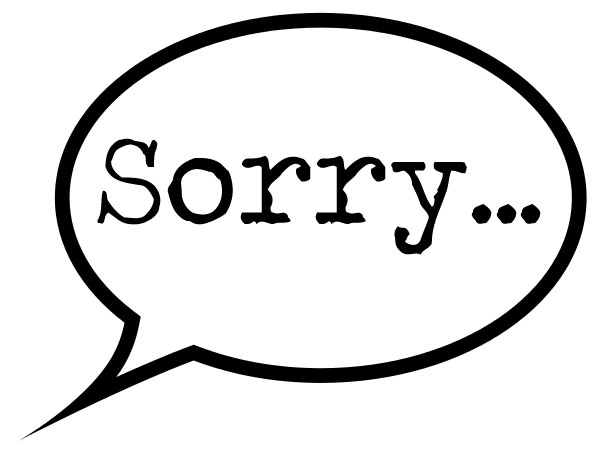Pop Quiz! When do you say “sorry?” Circle any that apply.
- When someone else bumps into you
- When you feel you’re imposing on a teacher by asking too many questions
- When you drop your phone and it makes a scary noise
- Right before you share your opinion about something
If you circled any of the above, I have some news for you: You Are Too Apologetic.
I can’t say I’m an expert on people, but I can say that I’m observant. Lately, the use of “sorry” has become more apparent to me, especially around campus.
According to the Merriam-Webster Dictionary via Google, “sorry” is “feeling sorrow or regret.” Chances are, 90% of the time I hear “sorry,” there is no sorrow, nor is there regret. From the forced apologies after taking a sibling’s last piece of Halloween candy, to saying sorry for having some place to go, it seems that the word means nothing. If the word means nothing, how does one express regret and a sincere apology? But why is this an issue? Why does it matter if people misuse that word? Why does it bug me? Two possibilities of reason:
- People don’t know what “sorry” means. Needless to say, it’s a huge pet peeve of mine. To me, “sorry” should mean something. It’s not, or shouldn’t be, a word that is bounced around like a ping pong ball. I have always believed that I should not say “sorry” unless I did something wrong. If there is nothing to be sorry for, I should not say the word. An apology should be something that can be accepted. An apology should be sincere. It shouldn’t mean anything if you keep doing what you say you’re sorry for. An apology should be used to express sincere regret. Or for this reason:
- People do know what “sorry” means, in which case, we have an even bigger issue. I have a theory. If people are saying sorry in a genuine way, it is due to the apologetic nature of our generation. Since around 2013, the “I don’t care” attitude has taken the throne. The nonchalant attitude of “I don’t care” has turned into insecurity, because we have and been treated with the “I don’t care” style. Now, we do not give ourselves credit for anything, and think we’re a burden to everyone surrounding us because we end up believing that people actually don’t care. Too many people live insecure, apologetic lives, and it’s unhealthy. We apologize for actions that we are not responsible for, such as when someone else bumps into us, or when someone is blocking our way. Not only have we begun to apologize for other’s actions, but we have begun to apologize for our voices, our opinions, and what we believe in. It has turned us into apologizing for our existences. Perhaps it’s subconscious, but I know that when I look around our school, very few have the air of confidence they should have. I’ve noticed the lack of confidence in our speech as well.
“I guess” vs “I know.” “Yeah” vs “yes.” The indefinite, quasi words that are weak and non-binding. The words we use so we don’t accidentally offend someone. The “I don’t care” is actually an “I do care, but I’m scared of asserting myself.” It is the reason for playing dumb and avoiding confrontation. It is the reason for not having an opinion; not having a voice.
It’s easy to mindlessly use a word that we are so used to hearing, but the importance of what we are saying deserves to have a presence in our minds. It is important to remember that we have a right to our opinion, and we have a right to have that opinion heard. In America, we cannot legally be stopped for doing so, but it seems that as a people, we have stopped each other from that. So we say “sorry”, and avoid opposition, and are attacked if we have an opposing view. Now, I ask of you all one thing: choose your words carefully, but say them. Abandon the hesitance, and speak the mind you have. You have a right to be on this earth, and you have a right to be heard. Things won’t change if you don’t. Don’t be sorry. You have a right.


